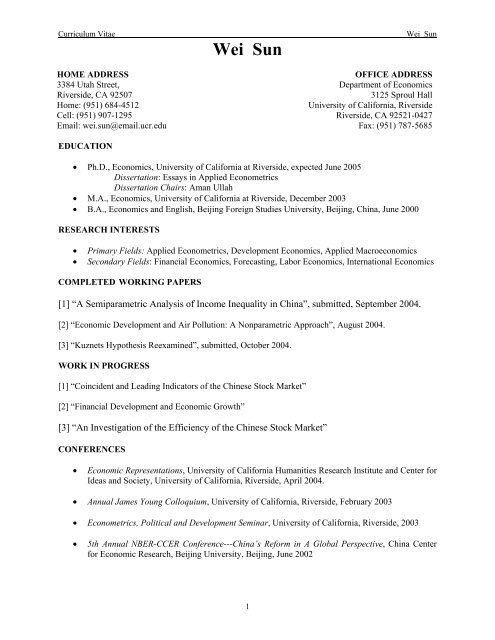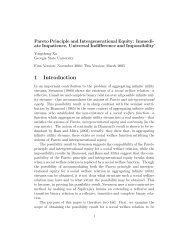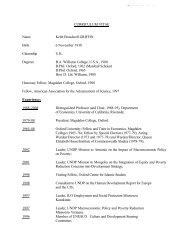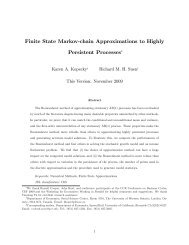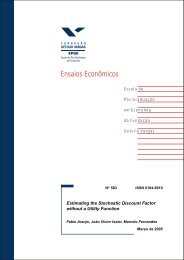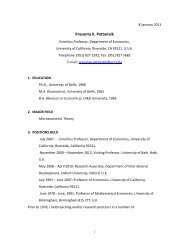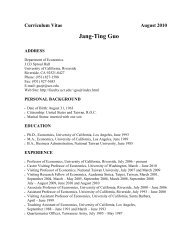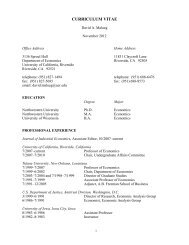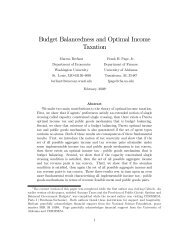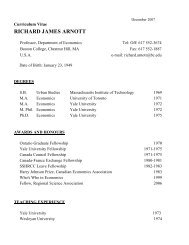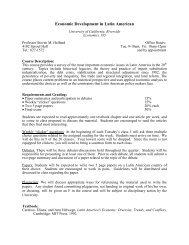Wei Sun - Economics - University of California, Riverside
Wei Sun - Economics - University of California, Riverside
Wei Sun - Economics - University of California, Riverside
You also want an ePaper? Increase the reach of your titles
YUMPU automatically turns print PDFs into web optimized ePapers that Google loves.
Curriculum Vitae<br />
HOME ADDRESS<br />
3384 Utah Street,<br />
<strong>Riverside</strong>, CA 92507<br />
Home: (951) 684-4512<br />
Cell: (951) 907-1295<br />
Email: wei.sun@email.ucr.edu<br />
EDUCATION<br />
<strong>Wei</strong> <strong>Sun</strong><br />
<strong>Wei</strong> <strong>Sun</strong><br />
OFFICE ADDRESS<br />
Department <strong>of</strong> <strong>Economics</strong><br />
3125 Sproul Hall<br />
<strong>University</strong> <strong>of</strong> <strong>California</strong>, <strong>Riverside</strong><br />
<strong>Riverside</strong>, CA 92521-0427<br />
Fax: (951) 787-5685<br />
• Ph.D., <strong>Economics</strong>, <strong>University</strong> <strong>of</strong> <strong>California</strong> at <strong>Riverside</strong>, expected June 2005<br />
Dissertation: Essays in Applied Econometrics<br />
Dissertation Chairs: Aman Ullah<br />
• M.A., <strong>Economics</strong>, <strong>University</strong> <strong>of</strong> <strong>California</strong> at <strong>Riverside</strong>, December 2003<br />
• B.A., <strong>Economics</strong> and English, Beijing Foreign Studies <strong>University</strong>, Beijing, China, June 2000<br />
RESEARCH INTERESTS<br />
• Primary Fields: Applied Econometrics, Development <strong>Economics</strong>, Applied Macroeconomics<br />
• Secondary Fields: Financial <strong>Economics</strong>, Forecasting, Labor <strong>Economics</strong>, International <strong>Economics</strong><br />
COMPLETED WORKING PAPERS<br />
[1] “A Semiparametric Analysis <strong>of</strong> Income Inequality in China”, submitted, September 2004.<br />
[2] “Economic Development and Air Pollution: A Nonparametric Approach”, August 2004.<br />
[3] “Kuznets Hypothesis Reexamined”, submitted, October 2004.<br />
WORK IN PROGRESS<br />
[1] “Coincident and Leading Indicators <strong>of</strong> the Chinese Stock Market”<br />
[2] “Financial Development and Economic Growth”<br />
[3] “An Investigation <strong>of</strong> the Efficiency <strong>of</strong> the Chinese Stock Market”<br />
CONFERENCES<br />
• Economic Representations, <strong>University</strong> <strong>of</strong> <strong>California</strong> Humanities Research Institute and Center for<br />
Ideas and Society, <strong>University</strong> <strong>of</strong> <strong>California</strong>, <strong>Riverside</strong>, April 2004.<br />
• Annual James Young Colloquium, <strong>University</strong> <strong>of</strong> <strong>California</strong>, <strong>Riverside</strong>, February 2003<br />
• Econometrics, Political and Development Seminar, <strong>University</strong> <strong>of</strong> <strong>California</strong>, <strong>Riverside</strong>, 2003<br />
• 5th Annual NBER-CCER Conference---China’s Reform in A Global Perspective, China Center<br />
for Economic Research, Beijing <strong>University</strong>, Beijing, June 2002<br />
1
Curriculum Vitae<br />
<strong>Wei</strong> <strong>Sun</strong><br />
TEACHING EXPERIENCE<br />
Instructor<br />
Department <strong>of</strong> <strong>Economics</strong>, <strong>University</strong> <strong>of</strong> <strong>California</strong>, <strong>Riverside</strong>, Summer 2002/2003<br />
Macroeconomic Theory<br />
Teaching Assistant<br />
Department <strong>of</strong> <strong>Economics</strong>, <strong>University</strong> <strong>of</strong> <strong>California</strong>, <strong>Riverside</strong>, Fall 2001-Present<br />
Introduction to Microeconomics, Introduction to Macroeconomics, Intermediate Macroeconomics,<br />
Intermediate Microeconomics, Research and Business Methods, International Trade, Money and<br />
Banking<br />
BUSINESS EXPERIENCE<br />
Research Intern, Deputy General Economist Assistant<br />
China International Industrial and Commerce Co., Ltd., Beijing, China, Summer 2002<br />
Research Intern, Deputy Director Assistant<br />
Imports and Exports Division, People’s Republic <strong>of</strong> China Economic and Trade Commission, Beijing,<br />
China, Summer 1999<br />
AWARDS<br />
• Chancellor’s Distinguished Fellowship, <strong>University</strong> <strong>of</strong> <strong>California</strong> at <strong>Riverside</strong>, 2000-2004<br />
• Excellent Student Leadership <strong>of</strong> Beijing, Education Commission <strong>of</strong> Beijing, Beijing, 2000<br />
• Philippine National Bank Scholarship, Beijing Foreign Studies <strong>University</strong>, 1999<br />
• Elizabeth Crookes Scholarship, Beijing Foreign Studies <strong>University</strong>, 1998<br />
PROFESSIONAL AFFILIATIONS<br />
American Economic Association, Econometric Society, American Finance Association<br />
2
Curriculum Vitae<br />
REFERENCES<br />
<strong>Wei</strong> <strong>Sun</strong><br />
Pr<strong>of</strong>essor Aman Ullah<br />
Department <strong>of</strong> <strong>Economics</strong><br />
<strong>University</strong> <strong>of</strong> <strong>California</strong>, <strong>Riverside</strong><br />
<strong>Riverside</strong>, CA 92521-0427<br />
(951) 827-1591<br />
ullah@mail.ucr.edu<br />
Pr<strong>of</strong>essor Keith Griffin<br />
Department <strong>of</strong> <strong>Economics</strong><br />
<strong>University</strong> <strong>of</strong> <strong>California</strong>, <strong>Riverside</strong><br />
<strong>Riverside</strong>, CA 92521-0427<br />
(951) 827-4108<br />
griffin@mail.ucr.edu<br />
Pr<strong>of</strong>essor Azizur Rahman Khan<br />
Department <strong>of</strong> <strong>Economics</strong><br />
<strong>University</strong> <strong>of</strong> <strong>California</strong>, <strong>Riverside</strong><br />
<strong>Riverside</strong>, CA 92521-0427<br />
(951) 827-1581<br />
khan@mail.ucr.edu<br />
Pr<strong>of</strong>essor Tae-Hwy Lee<br />
Department <strong>of</strong> <strong>Economics</strong><br />
<strong>University</strong> <strong>of</strong> <strong>California</strong>, <strong>Riverside</strong><br />
<strong>Riverside</strong>, CA 92521-0427<br />
(909) 827-1509<br />
taelee@mail.ucr.edu<br />
3
Curriculum Vitae<br />
RESEARCH SUMMARY<br />
<strong>Wei</strong> <strong>Sun</strong><br />
[1] “A Semiparametric Analysis <strong>of</strong> Income Inequality in China” (Job Market Paper)<br />
This paper presents a semiparametric analysis <strong>of</strong> changes in the distribution <strong>of</strong> Chinese household income<br />
over the period from 1988 to 1995. This analysis adopts the density re-weighting procedure to study how<br />
economic policy reforms and changes in social and demographic factors affect the overall income<br />
inequality. It distinguishes itself from previous literature in two ways. First, it is the first paper that<br />
focuses on the entire distribution <strong>of</strong> household income, rather than Gini coefficient or some other<br />
summary measures, to study the changes in income inequality in urban China. This approach provides a<br />
visually clear representation <strong>of</strong> the shape <strong>of</strong> the income distribution and where in the distribution that<br />
various factors have the greatest impact. The effects <strong>of</strong> each <strong>of</strong> factors on changes in various summary<br />
measures <strong>of</strong> inequality are also computed to compare our results with those in other research. Second, two<br />
important theoretical issues <strong>of</strong> the counterfactual density estimation methodology are rigorously<br />
examined—how to choose the optimal bandwidth and how to test the difference between counterfactual<br />
and actual densities. The results find that changes in household structure, particularly the declining<br />
proportion <strong>of</strong> large families, housing welfare, ownership <strong>of</strong> economic structure, socio-demographic<br />
attributes and economic returns to these attributes contributed to the increase in inequality. These factors<br />
together account for about 70 percent <strong>of</strong> the observed increase in inequality. The results demonstrate that<br />
secular social and demographic trends are as important as economic policy reforms in explaining changes<br />
in the Chinese distribution <strong>of</strong> household incomes over the period.<br />
[2] “Economic Development and Air Pollution: A Nonparametric Approach”<br />
This paper examines the empirical interplay between economic growth and CO 2 emissions using<br />
nonparametric methods and panel data. The results demonstrate that relationship between CO 2 and GNP<br />
per capita around the world displays a monotonous upward sloping shape rather than the well-known<br />
inverted-U shape curve which is predicted by the Environmental Kuznets Hypothesis and supported by ad<br />
hoc parametric specification in previous empirical research. Based on this result, I argue that existing<br />
empirical evidence on Environmental Kuznets Hypothesis is highly sensitive to functional form<br />
assumptions and thus might be spurious due to the functional misspecification problem. The<br />
consequent policy implication is that both developed countries and developing countries should<br />
actively make efforts to reduce CO 2 emissions.<br />
[3] “Kuznets Hypothesis Reexamined”<br />
This paper presents a brief review <strong>of</strong> the recent literature around the Kuznets hypothesis and propose an<br />
explanation for the conflicting empirical results as well as theoretical debates from a methodological<br />
4
Curriculum Vitae<br />
<strong>Wei</strong> <strong>Sun</strong><br />
perspective. Specifically, I apply the Kuhnian framework to analyzing some major reasons and features <strong>of</strong><br />
changes in the literature. It shows that the components <strong>of</strong> Kuhn’s analysis closely fit the transition in the<br />
inequality-income literature. This application allows us to make sense <strong>of</strong> the debate and thus to discover<br />
those things unacknowledged under the surface which are what the real arguments are about.<br />
[4] ““Risk, Return and Efficiency <strong>of</strong> the Chinese Stock Market”<br />
This paper studies the dynamic behavior <strong>of</strong> risks and returns in Chinese stock markets. I characterize the<br />
time-series properties <strong>of</strong> stock-market return and volatility and test the market efficiency hypothesis. I<br />
establish and estimate an empirical model that captures the effect <strong>of</strong> local and global information<br />
variables on the conditional mean <strong>of</strong> stock-market returns and characterize the second order conditional<br />
moments using three error generation processes. I find that stock-market volatility is time-varying, mildly<br />
persistent, and is best described by a fat-tailed distribution such as the Stable distribution.<br />
5


